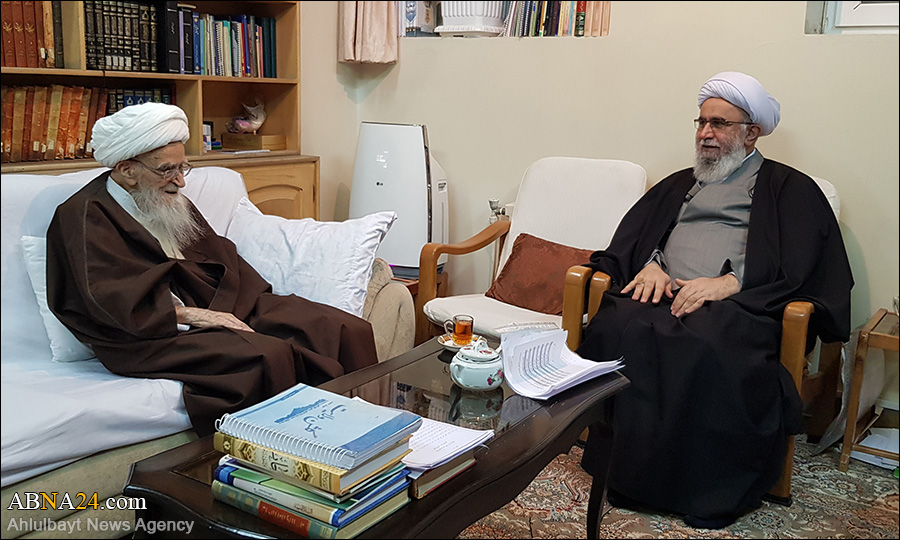Ayatollah Safi Golpaygani, scholarly pillar in the seminary: Ayatollah Ramazani
Secretary General of the AhlulBayt (a.s.) World Assembly stated, “Grand Ayatollah Safi Golpaygani was a scholarly pillar in various fields of the seminary. He was considered an insightful Marja and the Marja of the time.”
ABWA Official Website – On Thursday, January 5, 2023, at the conference which was held to commemorate the services of the late Grand Ayatollah Safi Golpaygani by the graduates and missionaries of Dar Al-Zahra (a.s.) Institute in the conference hall of Dar al-Shafa seminary, Ayatollah Ramazani referring to the performance of Dar Al-Zahra (a.s.) Institute stated, “Valuable measures were carried out under the leadership of Grand Ayatollah Safi Golpaygani in this institute. It is also appreciated that this move has continued.”

“Grand Ayatollah Safi Golpaygani was a scholarly pillar in various fields of the seminary. He was considered an insightful Marja and the Marja of the time. He was concerned about the developments of the Islamic world, including the events in Afghanistan, and issuing rulings against ulama such as Sheikh Baqir al-Nimr by Saudis, and he took a stand on them,” he continued.
“Many are trying to introduce Islam as extreme to human society. Today we are witnessing a serious confrontation between Islam and the arrogant world. Comprehensive Islam could establish a system in today’s world. Grand Ayatollah Safi Golpayegani was sensitive to ISIS sedition and extremism, by which many of us were victim,” added Secretary General of the AhlulBayt (a.s.) World Assembly.
Referring to the relationship of Grand Ayatollah Safi Golpaygani with the Islamic Republic, Ayatollah Ramazani said, “We are now at a historical turning point in various fields. Grand Ayatollah Safi Golpaygani proved himself in different positions in the Islamic government. In the condolence message of the Supreme Leader of the Revolution, it is also stated that Grand Ayatollah Safi Golpaygani was one of the sympathizers and concerned people for the the Islamic government. According to his will, this Marja (source of emulation) was buried in the Holy Shrine of Imam Hussain (a.s.) in Karbala, and people visit his grave.”
“In the last few decades, when I was in Karaj and when I was in the Hamburg Islamic Center, I was honored to meet Grand Ayatollah Safi Golpaygani. In one of these meetings, the clergy of the Hamburg Islamic Center were also honored to meet with this Marja. Grand Ayatollah Safi Golpaygani shed tears of joy when he saw these students, who spoke in different languages, and was pleased with the report presented about the activities of the Islamic Center of Hamburg,” he continued.
“The conduct of Grand Ayatollah Safi Golpaygani as a Marja was excellent. He respected not only the seminary professors but also the clergy. Grand Ayatollah Safi Golpaygani did not seek to become a Marja, but it was Marjaiat that came to him,’ added the Secretary General of the AhlulBayt (a.s.) World Assembly.
In other part of his speech, while referring to the impact of technology in the new era, Ayatollah Ramazani stated, “Today we are faced with new technologies, and we should not lag behind them. This technology has affected all sectors. For instance, a missionary used to be considered only a preacher on the pulpit. While today, the meaning of missionary and mission (propagation of Islam) has changed, and we must have a specialized look at the field of propagation. Due to the advancement and development of technology, the way for propagation (of Islam) have not been paved at any time like our time.”
“The content of Islam with the statements of the AhlulBayt (a.s.) is unparalleled in the world. Of course, in this regard, we must consider the propagation environment. According to the AhlulBayt (a.s.) school, spirituality should be on the path of monotheism and responsibility-oriented. Propagation of religious teachings should be conducted by missionaries. This should be carried out with the language of the general public. There are many questions about religion, and it is emphasized in the narrations that people need to communicate with religious scholars. Therefore, clerics and ulama should answer people’s questions,” he continued.
“A missionary must answer the questions and doubts raised (about Islam). Today, some consider it their duty to introduce religion as secular. Many issues that may be obvious to us are doubtful for others and should be addressed. Today can be considered the era of creating doubts in different sectors. Many graduates of educational centers outside Iran are either non-religious or believe in secular Islam. Many doubts have been raised about Mahdaviat. In this regard, Grand Ayatollah Safi Golpaygani authored the book “Muntakhb al-Athar” (The Selected Work) about Mahdaviat,” added the Secretary General of the AhlulBayt (a.s.) World Assembly.
Referring to the requirements of the missionaries, Ayatollah Ramazani stated, “Today, the missionaries must be armed with the weapon of knowledge and introduce religious teachings in depth. The weapon of the preacher should be the mastery of the language of understanding Islam. Some raise the doubt that since the Quran revealed in Arabic, it is not useful for non-Arabs. This is despite the fact that the language of the Quran is the language of Fitrah (divine nature of human). There are 300 verses in the Quran about reasoning. The Islamic concepts are all the matters of Fitrah. Islamic rules such as enjoining good and forbidding evil are also the matter of Fitrah.”
“One of the priorities is the training of missionaries in different fields, and this is the responsibility of the seminary. Of course, institutions such as Dar Al-Zahra (a.s.) Institute, which has a decade of history, can also play a role in this field,” he continued.
“Ulama are trustees of Islam, and they should manifest this trust in themselves first. Leading people towards God and AhlulBayt (a.s.) is the highest honor for ulama,” concluded the Secretary General of the AhlulBayt (a.s.) World Assembly. /345/
Secretary General of the AhlulBayt (a.s.) World Assembly stated, “Grand Ayatollah Safi Golpaygani was a scholarly pillar in various fields of the seminary. He was considered an insightful Marja and the Marja of the time.”
ABWA Official Website – On Thursday, January 5, 2023, at the conference which was held to commemorate the services of the late Grand Ayatollah Safi Golpaygani by the graduates and missionaries of Dar Al-Zahra (a.s.) Institute in the conference hall of Dar al-Shafa seminary, Ayatollah Ramazani referring to the performance of Dar Al-Zahra (a.s.) Institute stated, “Valuable measures were carried out under the leadership of Grand Ayatollah Safi Golpaygani in this institute. It is also appreciated that this move has continued.”

“Grand Ayatollah Safi Golpaygani was a scholarly pillar in various fields of the seminary. He was considered an insightful Marja and the Marja of the time. He was concerned about the developments of the Islamic world, including the events in Afghanistan, and issuing rulings against ulama such as Sheikh Baqir al-Nimr by Saudis, and he took a stand on them,” he continued.
“Many are trying to introduce Islam as extreme to human society. Today we are witnessing a serious confrontation between Islam and the arrogant world. Comprehensive Islam could establish a system in today’s world. Grand Ayatollah Safi Golpayegani was sensitive to ISIS sedition and extremism, by which many of us were victim,” added Secretary General of the AhlulBayt (a.s.) World Assembly.
Referring to the relationship of Grand Ayatollah Safi Golpaygani with the Islamic Republic, Ayatollah Ramazani said, “We are now at a historical turning point in various fields. Grand Ayatollah Safi Golpaygani proved himself in different positions in the Islamic government. In the condolence message of the Supreme Leader of the Revolution, it is also stated that Grand Ayatollah Safi Golpaygani was one of the sympathizers and concerned people for the the Islamic government. According to his will, this Marja (source of emulation) was buried in the Holy Shrine of Imam Hussain (a.s.) in Karbala, and people visit his grave.”
“In the last few decades, when I was in Karaj and when I was in the Hamburg Islamic Center, I was honored to meet Grand Ayatollah Safi Golpaygani. In one of these meetings, the clergy of the Hamburg Islamic Center were also honored to meet with this Marja. Grand Ayatollah Safi Golpaygani shed tears of joy when he saw these students, who spoke in different languages, and was pleased with the report presented about the activities of the Islamic Center of Hamburg,” he continued.
“The conduct of Grand Ayatollah Safi Golpaygani as a Marja was excellent. He respected not only the seminary professors but also the clergy. Grand Ayatollah Safi Golpaygani did not seek to become a Marja, but it was Marjaiat that came to him,’ added the Secretary General of the AhlulBayt (a.s.) World Assembly.
In other part of his speech, while referring to the impact of technology in the new era, Ayatollah Ramazani stated, “Today we are faced with new technologies, and we should not lag behind them. This technology has affected all sectors. For instance, a missionary used to be considered only a preacher on the pulpit. While today, the meaning of missionary and mission (propagation of Islam) has changed, and we must have a specialized look at the field of propagation. Due to the advancement and development of technology, the way for propagation (of Islam) have not been paved at any time like our time.”
“The content of Islam with the statements of the AhlulBayt (a.s.) is unparalleled in the world. Of course, in this regard, we must consider the propagation environment. According to the AhlulBayt (a.s.) school, spirituality should be on the path of monotheism and responsibility-oriented. Propagation of religious teachings should be conducted by missionaries. This should be carried out with the language of the general public. There are many questions about religion, and it is emphasized in the narrations that people need to communicate with religious scholars. Therefore, clerics and ulama should answer people’s questions,” he continued.
“A missionary must answer the questions and doubts raised (about Islam). Today, some consider it their duty to introduce religion as secular. Many issues that may be obvious to us are doubtful for others and should be addressed. Today can be considered the era of creating doubts in different sectors. Many graduates of educational centers outside Iran are either non-religious or believe in secular Islam. Many doubts have been raised about Mahdaviat. In this regard, Grand Ayatollah Safi Golpaygani authored the book “Muntakhb al-Athar” (The Selected Work) about Mahdaviat,” added the Secretary General of the AhlulBayt (a.s.) World Assembly.
Referring to the requirements of the missionaries, Ayatollah Ramazani stated, “Today, the missionaries must be armed with the weapon of knowledge and introduce religious teachings in depth. The weapon of the preacher should be the mastery of the language of understanding Islam. Some raise the doubt that since the Quran revealed in Arabic, it is not useful for non-Arabs. This is despite the fact that the language of the Quran is the language of Fitrah (divine nature of human). There are 300 verses in the Quran about reasoning. The Islamic concepts are all the matters of Fitrah. Islamic rules such as enjoining good and forbidding evil are also the matter of Fitrah.”
“One of the priorities is the training of missionaries in different fields, and this is the responsibility of the seminary. Of course, institutions such as Dar Al-Zahra (a.s.) Institute, which has a decade of history, can also play a role in this field,” he continued.
“Ulama are trustees of Islam, and they should manifest this trust in themselves first. Leading people towards God and AhlulBayt (a.s.) is the highest honor for ulama,” concluded the Secretary General of the AhlulBayt (a.s.) World Assembly. /345/





